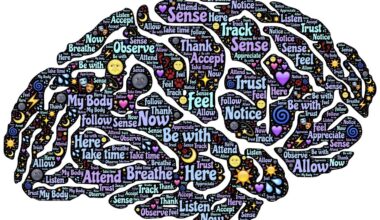How Aging Hormones Affect Body Composition and Physical Performance
Aging is a natural process that influences various aspects of human health, particularly body composition and hormonal balance. As we age, the levels of key hormones, such as testosterone and estrogen, decline, leading to significant changes in body structure and function. These hormonal fluctuations can result in increased fat accumulation, decreased muscle mass, and alterations in metabolism, all of which could detrimentally impact physical performance. The aging process not only affects hormonal secretion but also alters receptor sensitivity, thereby modifying how the body responds to these hormones. This dynamic can further complicate efforts to maintain a healthy weight and optimal performance levels. As such, understanding the link between aging hormones and body composition is critical for developing effective strategies to combat age-related weight gain and strength loss. Moreover, combating these challenges often requires targeted nutritional and exercise interventions designed to optimize hormone levels and improve body composition. In this article, we’ll delve into how different hormones influence body composition and provide actionable insights into managing the effects of aging on health and fitness.
Testosterone plays a crucial role in maintaining muscle mass, bone density, and overall physical performance, especially in aging men. As men get older, testosterone levels often decline, leading to a phenomenon known as andropause, which can trigger adverse effects on body composition. Reduced testosterone levels contribute to an increase in fat mass and decrease in lean muscle, making it more challenging to maintain a healthy weight. This hormonal decline can also impair metabolic function, making it easier to gain weight and harder to lose it. Consequently, men may experience reduced strength, diminished endurance, and a general decline in physical activity levels. To mitigate these changes, including strength training and high-intensity exercises can stimulate testosterone production and help preserve muscle mass. Additionally, a balanced diet rich in healthy fats and proteins may support hormonal health. It is also valuable to track hormone levels with a healthcare professional for personalized management strategies. Consequently, maintaining testosterone levels can significantly enhance body composition and promote better physical performance in aging individuals seeking to stay active and fit.
The Role of Estrogen in Women
Estrogen is another pivotal hormone in women’s body composition, influencing fat distribution, bone health, and muscle mass. As women age, particularly during menopause, estrogen levels drop dramatically, which can lead to increased abdominal fat and decreased bone density. This transition may also lead to mood disturbances, sleep issues, and decreased energy levels, making it harder to maintain an active lifestyle. The decline in estrogen can prompt a shift in body fat distribution, as more fat tends to accumulate around the abdomen while the legs and hips lose fat. Women can employ various strategies to counteract the effects of decreased estrogen, including engaging in regular exercise, focusing on strength training, and ensuring adequate calcium and vitamin D intake to support bone health. Additionally, hormone replacement therapy may be considered for some women, although it requires careful consultation with a healthcare provider to weigh potential benefits against risks. Maintaining healthy estrogen levels is essential for women seeking to manage body composition changes as they age, thus preserving both functional health and physical performance throughout their lives.
Insulin is a fundamental hormone that regulates glucose metabolism and fat storage in the body. Aging can disrupt insulin sensitivity, leading to higher levels of circulating insulin, a condition known as hyperinsulinemia. This can create an environment conducive to increased fat storage, particularly visceral fat, which is linked to a multitude of health problems like cardiovascular disease and type 2 diabetes. As insulin sensitivity decreases, the body’s ability to use glucose effectively declines, encouraging further fat accumulation. To counteract this, a well-balanced diet low in refined carbohydrates and high in fiber can improve insulin sensitivity. Regular physical activity also plays a crucial role by promoting better blood sugar control and enhancing muscle mass, which is metabolically active. Incorporating resistance training and aerobic exercises can thus maximize the effects of insulin and manage its levels effectively. Furthermore, lifestyle modifications like stress reduction and quality sleep can significantly enhance insulin function. Recognizing these factors allows individuals to take proactive measures toward improving body composition and preventing obesity and metabolic disorders associated with aging.
The Impact of Growth Hormone
Growth hormone (GH) is essential for growth, cell repair, and maintaining body composition throughout life. As we age, the secretion of growth hormone naturally decreases, which can lead to several undesirable effects. Lower levels of GH are associated with increased fat mass, decreased lean muscle mass, and impaired recovery following exercise. The decline in GH may also contribute to feelings of fatigue and reduced stamina, impacting physical performance. Exercise, particularly high-intensity interval training (HIIT) and resistance training, can help stimulate GH release, promoting muscle growth and fat loss. Additionally, adequate sleep quality is crucial, as GH is primarily released during deep sleep cycles. Incorporating sufficient sleep, maintaining a balanced diet, and managing stress can optimize GH levels. Nutrients such as amino acids and healthy fats also play a role in supporting growth hormone production. This comprehensive approach to enhancing GH levels can counteract aging effects and improve body composition, allowing older adults to maintain their physical performance and quality of life. Understanding the importance of growth hormone is vital for individuals looking to age gracefully and stay fit.
Thyroid hormones, particularly thyroxine (T4), influence metabolism and energy levels, playing a significant role in body composition. Aging can lead to alterations in thyroid function, resulting in either hypothyroidism or hyperthyroidism, both of which can profoundly impact body weight and composition. Hypothyroidism can lead to weight gain, fatigue, and muscle loss, while hyperthyroidism often results in weight loss, possibly to an unhealthy extent. As such, those experiencing changes in weight and energy levels should consult healthcare professionals for proper thyroid function assessments. Managing thyroid health through a balanced diet rich in iodine, selenium, and zinc is essential for proper hormone synthesis and activity. Regular check-ups and monitoring thyroid levels can also catch any developing conditions early, allowing for timely intervention. Treatments may include medication or lifestyle adjustments to optimize thyroid function and metabolic rates. Overall, understanding the connection between thyroid hormones and body composition is essential for older adults seeking to maintain a healthy weight and enhance physical performance as they age. Adopting healthy lifestyle choices will contribute significantly to mitigating age-associated changes.
Conclusion and Practical Applications
In conclusion, aging hormones significantly impact body composition and physical performance, creating distinct challenges for older adults. This intricate balance of hormones, including testosterone, estrogen, insulin, growth hormone, and thyroid hormones, collectively shapes how the body retains or loses muscle mass and gains or loses fat over time. By prioritizing exercise, proper nutrition, and regular health screenings, individuals can better manage the effects of these hormonal changes. Additionally, recognizing the specific roles of each hormone allows for tailored strategies that can promote muscle maintenance, fat loss, and overall wellness. Whether employing resistance training, eating a balanced diet, or seeking medical advice, the proactive approach can yield significant benefits. It’s essential to remain diligent and active to ensure that aging does not lead to unwanted body composition changes or a decline in physical abilities. Thus, embracing a healthier lifestyle coupled with knowledge about hormonal effects can empower older adults to age gracefully, maintaining both health and fitness without compromising quality of life. Implementing these principles today can lead to substantial improvements in tomorrow’s health and vitality.
Physical performance declines with age due to hormonal shifts that affect muscle, fat, and energy levels. Understanding these dynamics is key for effective interventions.


